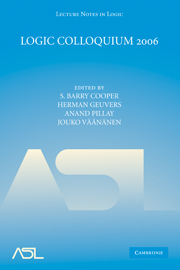Book contents
- Frontmatter
- Contents
- Introduction
- Definability and elementary equivalence in the Ershov difference hierarchy
- A unified approach to algebraic set theory
- Brief introduction to unprovability
- Higher-order abstract syntax in type theory
- An introduction to b-minimality
- The sixth lecture on algorithmic randomness
- The inevitability of logical strength: Strict reverse mathematics
- Applications of logic in algebra: Examples from clone theory
- On finite imaginaries
- Strong minimal covers and a question of Yates: The story so far
- Embeddings into the Turing degrees
- Randomness—beyond Lebesgue measure
- The derived model theorem
- Forcing axioms and cardinal arithmetic
- Hrushovski's amalgamation construction
The inevitability of logical strength: Strict reverse mathematics
Published online by Cambridge University Press: 28 January 2010
- Frontmatter
- Contents
- Introduction
- Definability and elementary equivalence in the Ershov difference hierarchy
- A unified approach to algebraic set theory
- Brief introduction to unprovability
- Higher-order abstract syntax in type theory
- An introduction to b-minimality
- The sixth lecture on algorithmic randomness
- The inevitability of logical strength: Strict reverse mathematics
- Applications of logic in algebra: Examples from clone theory
- On finite imaginaries
- Strong minimal covers and a question of Yates: The story so far
- Embeddings into the Turing degrees
- Randomness—beyond Lebesgue measure
- The derived model theorem
- Forcing axioms and cardinal arithmetic
- Hrushovski's amalgamation construction
Summary
Abstract. An extreme kind of logic skeptic claims that “the present formal systems used for the foundations of mathematics are artificially strong, thereby causing unnecessary headaches such as the Gödel incompleteness phenomena”. The skeptic continues by claiming that “logician's systems always contain overly general assertions, and/or assertions about overly general notions, that are not used in any significant way in normal mathematics. For example, induction for all statements, or even all statements of certain restricted forms, is far too general – mathematicians only use induction for natural statements that actually arise. If logicians would tailor their formal systems to conform to the naturalness of normal mathematics, then various logical difficulties would disappear, and the story of the foundations of mathematics would look radically different than it does today. In particular, it should be possible to give a convincing model of actual mathematical practice that can be proved to be free of contradiction using methods that lie within what Hilbert had in mind in connection with his program”. Here we present some specific results in the direction of refuting this point of view, and introduce the Strict Reverse Mathematics (SRM) program. See Corollary 11.12.
Many sorted free logic, completeness. We present a flexible form of many sorted free logic, which is essentially the same as the one we found presented in [Fe95], Section 3. In [Fe95], Feferman credits this form of many sorted free logic to [Pl68, Fe75, Fe79], and [Be85, page 97–99].
We prefer to use many sorted free logic rather than ordinary logic, because we are particularly interested in the naturalness of our axioms, and want to avoid any cumbersome or ad hoc features.
- Type
- Chapter
- Information
- Logic Colloquium 2006 , pp. 135 - 183Publisher: Cambridge University PressPrint publication year: 2009
- 4
- Cited by

